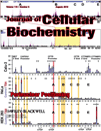
EXPERIMENTAL CELL RESEARCH
Scope & Guideline
Exploring the Frontiers of Cell Biology
Introduction
Aims and Scopes
- Cellular Mechanisms and Signaling Pathways:
The journal extensively covers research on cellular signaling pathways, including those involved in proliferation, differentiation, and apoptosis. This research often employs molecular biology techniques such as RNA sequencing, proteomics, and various imaging methods. - Cancer Biology and Therapeutics:
A significant portion of the journal's publications focuses on the molecular underpinnings of cancer, including tumor microenvironment interactions, cancer stem cells, and mechanisms of drug resistance. Studies often explore therapeutic targets and novel treatment strategies. - Stem Cell Research and Regenerative Medicine:
The journal features research on stem cells, including their differentiation, therapeutic applications, and roles in tissue regeneration. This area includes investigations into mesenchymal stem cells and induced pluripotent stem cells. - Cellular Stress Responses and Aging:
Research on how cells respond to stressors, such as hypoxia and oxidative stress, is prevalent. The journal discusses cellular aging mechanisms and their implications for diseases, particularly age-related disorders. - Extracellular Vesicles and Intercellular Communication:
Studies focusing on the role of extracellular vesicles in cell communication, their role in disease progression, and therapeutic potentials are increasingly prominent in the journal. - Immunology and Inflammation:
Research related to immune cell interactions, inflammatory responses, and their implications in various diseases, including cancer and autoimmune disorders, is a core area of interest.
Trending and Emerging
- MicroRNA and RNA Modifications:
Research on the roles of microRNAs and RNA modifications, particularly N6-methyladenosine (m6A) modifications, in regulating gene expression and cellular functions is rapidly expanding, highlighting their significance in various diseases. - Cellular Metabolism and Cancer:
An increasing number of studies are exploring the relationship between cellular metabolism alterations and cancer progression, particularly focusing on metabolic pathways that confer advantages to cancer cells. - Immunotherapy and Cancer Immunology:
The journal is increasingly publishing research on immunotherapeutic approaches, including the role of immune checkpoints, tumor microenvironment interactions, and the modulation of immune responses in cancer. - Organoid and 3D Culture Technologies:
There is a growing trend towards using organoid and 3D culture systems to study cellular behavior in a more physiologically relevant context, which enhances the understanding of tissue development and disease. - Extracellular Matrix Dynamics:
Research on the role of the extracellular matrix in influencing cell behavior, particularly in cancer and tissue engineering, is gaining prominence as scientists uncover its critical role in cellular signaling and function. - Cellular Senescence and Aging:
The investigation of cellular senescence and its implications for aging and age-related diseases is becoming a significant focus, with studies exploring the mechanisms and therapeutic targets associated with senescent cells.
Declining or Waning
- Traditional Cell Culture Models:
There is a noticeable decline in studies utilizing conventional 2D cell culture systems, as researchers increasingly recognize the limitations of these models in mimicking in vivo conditions. - Basic Mechanistic Studies Without Clinical Relevance:
Research that focuses solely on fundamental cellular mechanisms without a clear connection to clinical applications or translational potential is becoming less prevalent as journals seek to highlight studies with practical implications. - Single-Cell Analysis Technologies:
While single-cell technologies are gaining traction, there has been a relative decrease in basic single-cell analysis studies that do not contribute to understanding specific biological questions or diseases. - In vitro Drug Screening Studies:
Research centered on in vitro drug screening without subsequent validation in vivo or in clinical settings is becoming less emphasized, as there is a growing demand for studies that incorporate more complex biological systems.
Similar Journals

FEBS Journal
Catalyzing Progress in Biochemistry and BeyondFEBS Journal is a prestigious, peer-reviewed publication dedicated to advancing the field of biochemistry, cell biology, and molecular biology. Published by WILEY in the United Kingdom, this journal boasts an impressive impact factor and ranks in the top quartile (Q1) across multiple relevant categories, including Biochemistry, Cell Biology, and Molecular Biology, reflecting its significant contribution to scientific research. With an ISSN of 1742-464X and an E-ISSN of 1742-4658, the FEBS Journal publishes original research and comprehensive reviews that push the boundaries of knowledge and innovation in the biosciences. As a vital resource for researchers, professionals, and students alike, the journal offers Open Access options, ensuring that cutting-edge discoveries are accessible to a broad audience. With a publication history converging from 2005 to the present and a robust emphasis on high-quality scholarly work, the FEBS Journal remains an essential platform for the dissemination of significant findings and advancements in the life sciences.

FEBS LETTERS
Elevating Scientific Discourse in Biological FieldsFEBS LETTERS, published by Wiley, is a prestigious journal that has firmly established its place in the fields of biochemistry, biophysics, genetics, molecular biology, cell biology, and structural biology. With an esteemed history dating back to 1968, this journal continues to be a vital resource for researchers and professionals involved in the biological sciences. It boasts impressive quartile rankings, including Q1 statuses in several categories such as Biochemistry and Genetics, reflecting its high impact factor and significant contribution to scientific discourse. FEBS LETTERS provides a platform for innovative findings and critical reviews, fostering the exchange of knowledge and ideas within the scientific community. Although it operates under a subscription model, the journal ensures broad dissemination of groundbreaking research through its rigorous peer-review process. The vibrant discussions encouraged by articles published in FEBS LETTERS aim to inspire current and future generations of scientists to push the boundaries of biological understanding, making it an indispensable resource for anyone dedicated to advancing their knowledge in these dynamic fields.

Inflammation and Regeneration
Leading the charge in open-access immunology and regenerative research.Inflammation and Regeneration is a prominent open-access journal published by BMC, focused on the discerning fields of immunology, cell biology, and regenerative medicine. Since its establishment in 2016, the journal has provided a platform for the dissemination of high-quality research, contributing significantly to the advancement of knowledge in inflammation processes and regenerative therapies. With a remarkable impact reflected in its Q1 quartile rankings in Cell Biology and Immunology for 2023, Inflammation and Regeneration stands out as a leading resource for researchers and practitioners. The journal's commitment to open access ensures that critical findings are readily available to a global audience, fostering collaboration and innovation in the scientific community. With a Scopus ranking that places it in the top 20% of its categories, Inflammation and Regeneration serves as an essential reference for those seeking to stay at the forefront of immunological research and its applications.

JOURNAL OF CELLULAR PHYSIOLOGY
Unveiling Cellular Mysteries for a Healthier TomorrowJOURNAL OF CELLULAR PHYSIOLOGY, published by Wiley, is a leading peer-reviewed journal that has been at the forefront of cellular research since its inception in 1945. With its prestigious Q1 and Q2 rankings in the fields of Clinical Biochemistry and Cell Biology, this journal is highly regarded within the scientific community, reflecting its significant impact factor and rigorous peer-review process. Addressing the intricacies of cell function and physiology, it serves as a crucial resource for researchers, professionals, and students dedicated to advancing knowledge in the life sciences. The journal publishes cutting-edge research articles, integral reviews, and significant findings that bridge basic biology and clinical applications, ensuring access to high-quality scholarly content that informs current practices and future research directions. Although not open access, the journal maintains a rich archive of studies, making it an essential reference point for those invested in the health and biological sciences.

INTERNATIONAL JOURNAL OF BIOCHEMISTRY & CELL BIOLOGY
Pioneering Research in Biochemistry and Cell DynamicsThe International Journal of Biochemistry & Cell Biology, published by Pergamon-Elsevier Science Ltd, stands as a pivotal resource in the fields of biochemistry and cell biology. With an ISSN of 1357-2725 and an E-ISSN of 1878-5875, this prestigious journal has been a key platform for disseminating cutting-edge research since its inception in 1995. The journal currently holds an impressive Q1 ranking in Biochemistry and a Q2 ranking in Cell Biology for the year 2023, reflecting its commitment to high-quality research and its influence within the scientific community. With a significant Scopus ranking of 94/438 in Biochemistry and 96/285 in Cell Biology, the journal plays a crucial role in advancing knowledge and fostering innovative approaches in these dynamic fields. Though it is not an open-access journal, the International Journal of Biochemistry & Cell Biology remains accessible to a wide audience, making it a vital resource for researchers, professionals, and students alike, who are eager to explore and contribute to the ongoing advancements in biochemistry and cell biology.

JOURNAL OF CELL BIOLOGY
Transforming Understanding Through Cellular ResearchJOURNAL OF CELL BIOLOGY, published by Rockefeller University Press, stands as a leading authority in the fields of Cell Biology and Medicine, reflected by its esteemed Q1 ranking in both categories as of 2023. Established in 1955, this journal has become a pivotal platform for disseminating groundbreaking research that enhances our understanding of cellular processes and their implications in various biological contexts. With a broad scope that encompasses experimental and theoretical studies alike, the JOURNAL OF CELL BIOLOGY embraces a rich diversity of topics, making it essential reading for researchers, students, and professionals committed to advancing cellular research. Although the journal does not currently offer open access options, its robust reputation, underscored by a competitive Scopus ranking of 43 out of 285 in the Cell Biology category, ensures that published findings reach a wide audience and influence the ongoing discourse in the life sciences. For those interested in staying at the forefront of cell biological research, the JOURNAL OF CELL BIOLOGY represents a critical resource.

JOURNAL OF CELLULAR BIOCHEMISTRY
Shaping the Future of Biochemical and Cellular ResearchJournal of Cellular Biochemistry is a premier academic journal dedicated to advancing the field of biochemistry and cellular biology. Published by Wiley, this influential journal has a significant impact factor that underscores its relevance and authority within the scientific community. With its ISSN 0730-2312 and E-ISSN 1097-4644, the journal has been on the frontier of research since its inception in 1982, and is expected to continue publishing cutting-edge studies through 2024. As evidenced by its ranking in the 2023 Scopus Quartiles, it holds a rank of Q2 in Biochemistry and Q3 in both Cell and Molecular Biology, placing it among the top tiers of scientific journals in these disciplines. The Journal of Cellular Biochemistry serves as a vital resource for researchers, professionals, and students alike, providing a platform for the dissemination of innovative ideas and findings that shape our understanding of cellular processes and biochemical pathways. Though it does not currently offer Open Access options, its robust peer-review process ensures that each publication meets the highest academic standards, thus solidifying its esteemed position in the landscape of biochemical research.

CELL BIOLOGY INTERNATIONAL
Connecting Discoveries to Medical InnovationsCELL BIOLOGY INTERNATIONAL is a prestigious academic journal dedicated to the rapidly evolving field of cell biology, publishing high-quality research aimed at understanding cellular processes and their implications in various biological contexts. Published by Wiley, this journal has established its relevance with an H-Index that reflects its robust citation impact and a commendable Scopus Rank of #111 out of 285 in the field of Biochemistry, Genetics, and Molecular Biology, positioning it in the 61st percentile. Although it operates under a traditional subscription model, its influential insights are crucial for researchers, professionals, and students alike who are seeking cutting-edge developments in cellular mechanisms and their applications in medicine. The journal spans contributions dating back to 1993, providing a rich archive of knowledge that continues to shape the discourse within the scientific community. With a strong category ranking of Q3 in Cell Biology and Q2 in Medicine (miscellaneous) as of 2023, CELL BIOLOGY INTERNATIONAL stands as a reliable platform for disseminating transformative science in the cellular domain.

Cell Stress
Unlocking the Secrets of Cell Stress MechanismsCell Stress is a prestigious, peer-reviewed open access journal dedicated to advancing research in the fields of biochemistry, genetics, molecular biology, cancer research, and physiology. Published by SHARED SCIENCE PUBLISHERS OG in Austria, this journal has rapidly established itself since its inception in 2017, achieving Q1 status in multiple categories, indicative of its high impact and quality. With an impressive Scopus ranking—holding a top percentile position in its respective fields—Cell Stress aims to foster interdisciplinary collaboration and disseminate cutting-edge findings that enhance our understanding of cellular stress mechanisms and their implications in health and disease. The journal's commitment to open access since its launch ensures that critical research is accessible to a global audience, thereby facilitating the exchange of knowledge among researchers, professionals, and students alike. Address your submissions or inquiries to AM BLUMENHAG 25-4, Graz 8010, Austria, and contribute to this dynamic platform that is shaping the future of molecular medicine.

BIOCELL
Pioneering Discoveries in Molecular BiologyBIOCELL is a distinguished peer-reviewed journal dedicated to the field of Cell Biology, published by TECH SCIENCE PRESS. Since its inception in 1995, the journal has been at the forefront of disseminating innovative research, with converged publication years extending from 1995 to 2013 and from 2015 to 2024. Although it currently holds a Q4 ranking in the Cell Biology category according to the 2023 category quartiles, BIOCELL aims to foster advancements by providing a platform for researchers, professionals, and students to share their findings in biochemistry, genetics, and molecular biology. The journal is available in both print (ISSN: 0327-9545) and digital formats (E-ISSN: 1667-5746) and seeks to attract contributions that enhance scholarly dialogue and understandings of cellular mechanisms and innovations. With a commitment to quality research and critical discourse, BIOCELL plays an important role in nurturing the scientific community within Argentina and beyond, offering vital insights that contribute to the advancement of the life sciences.